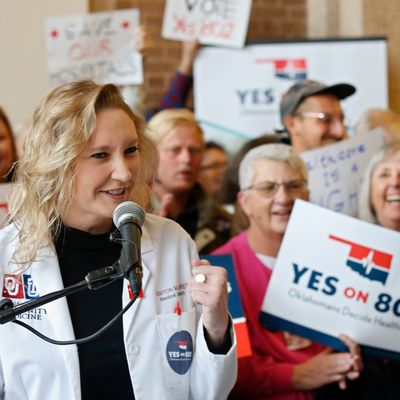
The people of Oklahoma voted to expand Medicaid on Tuesday, with mostly urban voters pushing the measure over the line by a one percent margin. The state is the 37th to expand the program since the Supreme Court’s landmark Obamacare ruling in 2012, which left the decision of whether to do so under local control. Notably, Oklahoma is one of several Republican-controlled states to get to “yes” via referendum, despite opposition from its own governing party. “In the middle of a pandemic, Oklahomans stepped up and delivered life-saving care for nearly 200,000 of our neighbors, took action to keep our rural hospitals open, and brought our tax dollars home to protect jobs and boost our local economy,” Amber England, the manager for the Yes on 802 campaign, told the Oklahoman. (Medicaid expansion was State Question 802 on Tuesday’s ballot.)
Expansion opponents emphasized to the Oklahoman and other outlets that the margin of victory was slim; most counties in the state rejected expansion. But while ideology was likely a major factor, the state is also experiencing a spike in COVID-19 cases, and limited absentee voting may have lowered voter turnout, especially among vulnerable populations who stand to benefit from expansion the most.
A simmering public-health crisis may have also helped push the measure over the line. No rural community is safe from an ongoing spate of hospital closures, but the crisis has hit Oklahoma with particular force. In 2019, the state tied with Georgia for the third-highest number of hospital closures in the nation. A physician shortage has troubled the state for years, and deprived urban and rural residents alike of access to basic health care. COVID-19 only makes the situation more urgent. The same day voters approved Medicaid expansion, the state recorded its highest number of positive COVID-19 cases to date.
Voters, meanwhile, have few tools out their disposal — aside from voting in different lawmakers. Oklahoma’s Republican governor Kevin Stitt is hostile both to Medicaid expansion and the reintroduction of lockdown measures intended to halt the spread of coronavirus. By passing SQ 802, voters went around Stitt and his party. And according to the Oklahoman, expansion will be “enshrined” in the state’s constitution, which may limit Republicans from following the example set by their peers in other conservative states. In Utah, for example, Republicans couldn’t prevent voters from approving Medicaid expansion, but they did pass a bill whittling expansion down into the most limited version of itself, effectively defying the wishes of the majority.
Politico also notes that the passage of SQ 802 will complicate Stitt’s plan to create “a more limited form of the Medicaid expansion.” Stitt had applied for a federal waiver to convert Medicaid payments into a block grant program and enforce work requirements. But ahead of an announced July 1 launch, Stitt changed his mind. According to a report in Kaiser Health News, he “surprised many in May with a veto of state funding for his own proposal.” Stitt’s block grant plan might still be possible even after Tuesday’s vote, but the legality is unclear; if he moves ahead, the matter could end up in court.
But for now, at least 200,000 people will now be eligible for Medicaid. In the middle of a pandemic, that’s lifesaving news.






























